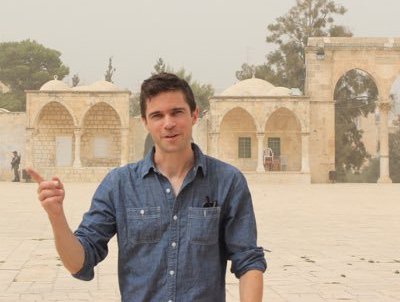Australia/Israel Review
Scribblings: A pro-Palestinian reporter encounters the “ethnic cleansing solution”
Mar 3, 2017 | Tzvi Fleischer

Tzvi Fleischer
Regular readers of this column will know I have often written about the apparent preference among many Palestinians for something I describe as the “ethnic cleansing” solution. This is an alternative to both the conventional two-state resolution, or even the “one-state solution”. This “solution” demands not only a single Palestinian state in all of the land between the Jordan River and the sea, but that most or all of the Jewish population of Israel, viewed as foreign invaders, should be forced to leave or be killed. I have demonstrated in past columns that both polling of Palestinians and rhetoric from Fatah and Hamas leaders indicate that this is what many Palestinians are apparently seeking.
I can now offer another strong piece of evidence from a very credible source. Hunter Stuart is an American journalist who went to Israel in the middle of 2015 to freelance. Here’s how he describes his views on arrival:
“I was very pro-Palestinian. Almost everyone I knew was. I grew up Protestant in a quaint, politically correct New England town; almost everyone around me was liberal. And being liberal in America comes with a pantheon of beliefs: You support pluralism, tolerance and diversity. You support gay rights, access to abortion and gun control.
“The belief that Israel is unjustly bullying the Palestinians is an inextricable part of this pantheon…”
A lot of his writing while in Israel was for very pro-Palestinian outlets like Al-Jazeera.
He has now written an article for the Jerusalem Report explaining how the past year and a half has changed his views, which I highly recommend. (“How a pro-Palestinian American reporter changed his views on Israel and the conflict”, published on February 15.)
In the piece he explains he now believes that too many excuses are being made for Palestinian violence, while Israel is being subjected to double standards by the media and NGOs who are “unusually fixated on highlighting the moral shortcomings of Israel, even as other countries acted in infinitely more abominable ways.” Further, he also says he now sees the dangers of Israel relinquishing the West Bank, and ending up with the Palestinians electing “Hamas, an Islamist group committed to Israel’s destruction,” as they did in Gaza.
What I want to highlight is one of the key reasons he changed his views – his encounters with Palestinians. He explains in the article:
“I also spent a lot of time traveling in the Palestinian territories getting to know Palestinians. I spent close to six weeks visiting Nablus and Ramallah and Hebron, and even the Gaza Strip. I met some incredible people in these places; I saw generosity and hospitality unlike anywhere else I’ve ever traveled to… But almost without fail, their views of the conflict and of Israel and of Jewish people in general was extremely disappointing.
…Even the kindest, most educated, upper-class Palestinians reject 100 percent of Israel ‒ not just the occupation of East Jerusalem and the West Bank. They simply will not be content with a two-state solution ‒ what they want is to return to their ancestral homes in Ramle and Jaffa and Haifa and other places in 1948 Israel, within the Green Line. And they want the Israelis who live there now to leave. They almost never speak of coexistence; they speak of expulsion, of taking back ‘their’ land.”
In other words, he saw the large prevalence of the demand for an “ethnic cleansing” solution among Palestinians.
Anyone who wants to understand why there is not yet a two-state peace needs to understand the reality about Palestinian attitudes that Stuart reveals.
Israel and Defence Aid
It is often brought up that Israel is the world’s largest recipient of US military aid. Israel gets 55% of the US military aid budget, dwarfing second place Egypt, which gets 23%. Why should little Israel get so much of Washington’s military largesse, it is often asked.
The answer is that it doesn’t – if you look at defence aid as a whole, of which direct monetary aid is only a tiny sliver of the total. The vast majority of US defence aid to other countries comes in the form of stationing troops there, both as a defensive tripwire and to help with training and military preparedness. This costs the US at least US$85-100 billion annually. Then there is assistance in the form of air and sea patrols of volatile borders and disputed sea areas for US allies.
Israeli academic Hillel Frisch has recently shown in a paper that, if you take these other forms of aid into account, defence aid to Israel is quite limited compared to other US allies.
Frisch estimates, using only the costs of maintaining overseas troops in other countries, that the biggest recipient of US defence aid is Japan, followed by Germany, then South Korea, then Italy. Their packages all dwarf Israel’s – Japan gets the equivalent of US$27 billion, almost nine times Israel’s package, Germany around US$21 billion, almost seven time Israel’s package.
Meanwhile, taking troops into account, Egypt gets more aid than Israel. Even Kuwait and Bahrain get almost as much as Israel.
The bottom line is that Israel is disadvantaged in calculations based on purely monetary aid because of the Israeli tradition of rejecting asking anyone else to directly fight in their defence. A fairer system of looking at defence aid would take into account that Israel does not ask for or want troops or air and sea patrols. And such a more comprehensive accounting of defence aid makes the already strong case that US defence aid to Israel is a good strategic investment for Washington even more convincing.
Tags: Israel






